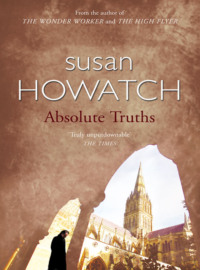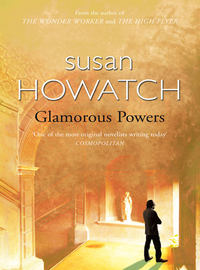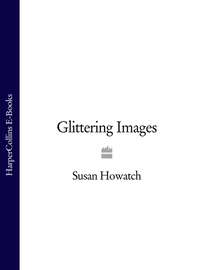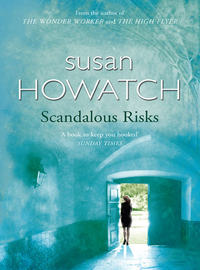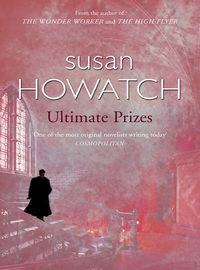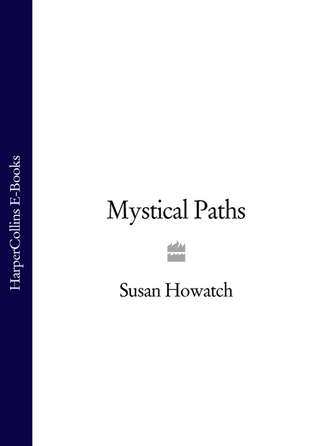
Полная версия
Mystical Paths

Susan Howatch
MYSTICAL PATHS


COPYRIGHT
HarperCollinsPublishers Ltd. 1 London Bridge Street London SE1 9GF
www.harpercollins.co.uk
Extracts from The River Within and Jung and the Christian Way by Christopher Bryant published and copyright 1978 and 1983 by Darton, Longman and Todd Ltd. Extracts from Canterbury Pilgrim and Canterbury Essays and Addresses by Michael Ramsay published by SPCK. All reproduced by kind permission of the publishers.
First published in Great Britain by HarperCollinsPublishers 1992, then by Fontana 1993 and by HarperCollinsPublishers 1995
Copyright © Leaftree Ltd 1992
The Author asserts the moral right to
be identified as the author of this work
A catalogue record for this book is
available from the British Library
All rights reserved under International and Pan-American Copyright Conventions. By payment of the required fees, you have been granted the nonexclusive, nontransferable right to access and read the text of this ebook on-screen. No part of this text may be reproduced, transmitted, downloaded, decompiled, reverse engineered, or stored in or introduced into any information storage and retrieval system, in any form or by any means, whether electronic or mechanical, now known or hereinafter invented, without the express written permission of HarperCollins ebooks
HarperCollinsPublishers has made every reasonable effort to ensure that any picture content and written content in this ebook has been included or removed in accordance with the contractual and technological constraints in operation at the time of publication
Source ISBN: 9780006496878
Ebook Edition © MAY 2012 ISBN: 9780007396405
Version: 2018-10-08
PRAISE
From the reviews:
‘Arguably no one writing today can equal Howatch’s ability to write compelling novels that combine theology and psychology in a complex, fast-moving plot offering beautifully delineated characters and the suspense of a mystery thriller’
Publishers Weekly
‘A fascinating, mind-bending exposition … Howatch wins out’
Sunday Times
‘Taking on the style of a psychological thriller … Mystical Paths covers in a profound and theologically thoughtful way the powers of light and powers of darkness … Her success should not go unrewarded’
Catholic Herald
‘Howatch writes thrillers of the heart and mind … everything in a Howatch novel cuts close to the bone and is of vital concern’
New Woman
‘Susan Howatch … is writing for anyone who can recognise that mysterious gift of the true storyteller’
Daily Telegraph
‘One of the most original novelists writing today’
Cosmopolitan
AUTHOR’S NOTE
Mystical Paths is the fifth in a series of novels about the Church of England in the twentieth century. Each book is designed to be read independently of the others, but the more books are read the wider will be the view of the multi-sided reality which is being presented.
The first novel, Glittering Images, was set in 1937. Glamorous Powers, narrated by Jon Darrow, opened in 1940, Ultimate Prizes was narrated by Neville Aysgarth after the war, and Scandalous Risks viewed the Church in 1963 through the eyes of Venetia Flaxton. The sixth and final novel, Absolute Truths, will take place in 1965, three years before the main events described by Nicholas Darrow in Mystical Paths, and Charles Ashworth, the narrator who opened the series, will narrate the novel which brings the series to a close.
The ecclesiastical era of Nicholas Darrow’s youth was dominated by ARTHUR MICHAEL RICHARD RAMSEY, who was born in 1904. While still in his thirties he became the Van Mildert Professor of Divinity in the University of Durham and a Canon of Durham Cathedral. Two years later he married. A short period as Regius Professor of Divinity at Cambridge preceded his appointment as Bishop of Durham at the age of forty-seven, and his ascent to the top of the Church’s hierarchy continued to be rapid: by 1956 he was Archbishop of York, and in 1961 he became the one hundredth Archbishop of Canterbury.
Ramsey combined a first-class intellect with a striking appearance and a considerable degree of eccentricity and originality in his speech, manner and dress; a member of the Catholic wing of the Church, he was the first Archbishop of Canterbury to adopt the uniform of a purple cassock instead of the traditional frock-coat and gaiters. The combination of eccentricity and a deep personal holiness made him seem a remote figure to some in the turbulent days of the 1960s, but others appreciated his traditionalism at a time when all traditions were coming under attack. Hostile at first to the outbreak of radical theology he later adopted a more flexible approach, recognising that the widespread questioning of both Christianity and the Church needed careful answering, not instant condemnation.
‘It may be the will of God that our church should have its heart broken,’ Ramsey said before his enthronement at Canterbury, and this proved a prophetic statement. During the secular triumphalism of the 1960s, the Church suffered a loss of confidence and a numerical decline, but Ramsey provided the spiritual leadership needed to sustain it during the dark days of demoralisation, and to lead it towards more fruitful times.
Having retired from Canterbury in 1974, he died in 1988 in the midst of an era very changed from the one over which he had presided twenty years before.
The thought of Jon and Nicholas Darrow reflects the work of CHRISTOPHER BRYANT, who was born in 1905 and ordained not long after he had graduated, like Michael Ramsey, from Cambridge University. In 1935 he became a professed member of the Society of St John the Evangelist, known as the Cowley Fathers, which is the oldest religious community for men in the Church of England. For almost all of the next twenty-five years he was based at the Society’s house in Oxford; he became first novice guardian, then assistant superior, and it was here that he began to make a special study of psychology.
In 1955 he was put in charge of St Edward’s House, the Society’s London home, and he became increasingly famous as a spiritual director. As he approached seventy his writing career began: he embarked on committing to paper the insights into religious belief which he had obtained from studying Jung’s psychology. The book failed to find a publisher, but another religious community came to the rescue and published it under their own imprint as Depth Psychology and Religious Belief. His other books, however, found favour with a well-known religious publisher and all his work came to have a wide readership. The River Within, The Heart in Pilgrimage and Jung and the Christum Way were published before his death. Journey to the Centre was published posthumously. He died in 1985
CONTENTS
COVER
TITLE PAGE
COPYRIGHT
PRAISE
AUTHOR’S NOTE
PART ONE THE JOURNEY AROUND THE CIRCLE
ONE
TWO
THREE
FOUR
FIVE
SIX
SEVEN
EIGHT
NINE
PART TWO THE JOURNEY TO THE CENTRE
ONE
TWO
THREE
FOUR
PART THREE SELF-REALISATION/ETERNAL LIFE
ONE
TWO
KEEP READING
ABOUT THE AUTHOR
BY SUSAN HOWATCH
ABOUT THE PUBLISHER
PART ONE
THE JOURNEY AROUND THE CIRCLE
‘Amidst the pressures and strains of life there is the longing of the self to realize itself by escaping from the dominance of the environment. There are many cults which offer such an escape, with an experience of a heightening of the faculties and a realization of the self in greater power of its own or of something beyond the self. But it is important to ask what is the reality which is experienced, and what is the effect not only upon the sensations but upon the life and character of the person who has had the experience. There is an old story of a man who was had up for being drunk. The magistrate asked, “Why do you get drunk like this?” and the man replied, “You see, your worship, it’s the shortest way out of Manchester.” Alcohol, drugs, the mystical techniques of various religions, may be the shortest way out of Manchester … But it matters very much where you get to, and what you are like when you come back.’
MICHAEL RAMSEY
Archbishop of Canterbury 1961–1974
Canterbury Pilgrim
‘God acts upon us inescapably through the people who touch and influence our lives.’
CHRISTOPHER BRYANT
Member of the Society of St John the Evangelist 1935–1985
The River Within
ONE
‘More than in the past, the young are striking out into intellectual independence and revolt against tradition.’
MICHAEL RAMSEY
Archbishop of Canterbury 1961–1974
Canterbury Pilgrim
I
I had just returned from an exorcism and was flinging some shirts into the washing machine when my colleague entered the kitchen. He was wearing his cassock and carrying a bottle of whisky. Beyond the window caked in city grime, sunlight blazed upon the battered dustbins in the back-yard.
‘How was the Gothic mansion haunted by the ravishing young ghost?’
‘Non-existent. The trouble was in a council house where the previous occupant had overdosed on heroin in the lavatory.’
‘Ah well, that’s 1988 for you … Drink?’
I declined but passed him a glass from the draining-board rack before I set the dials on the washing-machine. Meanwhile the electric kettle was coming to the boil. Absent-mindedly I reached for the teapot. ‘What’s new?’
‘Absolutely nothing. A drunk disrupted the lunch-time Eucharist, the Gay Christians demanded that we stock their literature on AIDS, and some neurotic female from the Movement for the Ordination of Women threatened to picket the church unless you sacked me – oh, and talking of neurotic women someone called Venetia telephoned twice to say she had to talk to you. She sounded like a nymphomaniac.’ He drank deeply from his whisky before adding: ‘Now why should the name Venetia remind me of the 1960s?’
There was a silence broken only by the click of the kettle as it switched itself off. Then I said: ‘She was a friend of Christian Aysgarth’s.’
‘Ah yes,’ said my colleague, suddenly motionless. ‘The Christian Aysgarth affair. 1968. Crisis, chaos and the Devil on the loose.’
The phone rang. Moving to the extension, which hung on the wall by the dresser, I unhooked the receiver and said neutrally: ‘St Bent’s Rectory.’
‘Darling!’ It was Venetia. ‘I thought I’d never get past that crusty old curate you keep!’
‘He’s not my curate. He’s my colleague at the Healing Centre.’
‘Well, chain him up somewhere, I can’t bear misogynists. Now darling, I know you were terribly sweet and madly keen that I should visit you for a little professional chat, but –’
‘– you’ve got cold feet.’
‘Slightly shivery, yes. When I awoke this morning I began to wonder if a Healing Centre was really quite my scene, and –’
‘Nobody’s asking you to fall in love with it. Just think of it as a back-drop. I’m the scene.’
‘Oh yes, lovely, simply too thrilling – but I can’t bear that word “counselling” – quite ruined by the 1980s – all those wild-eyed social workers descending like vultures on disaster-victims –’
‘I’m neither wild-eyed, nor a social worker, nor a vulture, and I’m not going to counsel. I’m going to listen.’
‘Oh, but I shall make a mess of talking – I make a mess of everything – I shall wind up totally speechless –’
‘Fine. Then we can sit in silence and soak up the vibes.’
‘Soak up the vibes! Oh Nick, how that phrase takes me back! Do you know it’s twenty years now – twenty years – since you came to see me about Christian? That mysterious quest of yours! You never did tell me the whole story, did you?’
‘“Whereof one cannot speak, thereof one must be silent.”’
‘No, don’t try and wriggle off the hook by quoting Wittgenstein! Look, let’s forget my visit to the Healing Centre – come and dine with me instead and tell me exactly what happened in 1968. I always found that official version curiously unsatisfactory.’
I realised it was time to take a firm line. ‘Sorry,’ I said, ‘but I don’t dine out during the week and I’ve no intention of forgetting your promise to visit the Healing Centre. I’ll see you on Thursday at eleven as we arranged yesterday in Starbridge.’
‘My dear, how masterful! Why is it I always find you so utterly impossible to resist?’ said Venetia crossly, and hung up.
Turning my back on the phone I found that my colleague had made the tea for me. ‘That’s the only woman I’ve ever met,’ I said, sitting down opposite him at the kitchen table, ‘who can recognise a quotation from Wittgenstein.’
‘She sounds extremely dangerous. Do be careful, Nicholas.’
I smiled at him. Then I drank my tea, stared into space and mentally turned back the clock to 1968, that demonic year when I had become so obsessed by Christian Aysgarth.
II
For most of 1968 I was twenty-five; my twenty-sixth birthday fell on Christmas Eve. Buried in that first quarter-century of my life were the time-bombs which exploded in 1968 – or perhaps it would be more accurate, though less colourful, to write: weaving through those first twenty-five years were the paths which eventually converged to lead me into the Christian Aysgarth mystery. The first path followed my convoluted relationship with my father. The second path followed my disastrous career as a psychic. And the third path followed my friendship with Marina Markhampton. By 1968 all three paths were running side by side – in fact they had become a three-lane motorway where the words ‘TO HELL’ came up on all the signboards – but in the beginning hell was a long way off and Path Number One led through the idyllic landscape of my childhood.
I was brought up in the country near the city of Starbridge where my father worked at the Theological College in the Cathedral Close. When I was still in the nursery he had been appointed Principal, but he had not been required to live on the premises and I can remember watching him ride off on his bicycle to the station where he would take the train to Starbridge, twelve miles away. If the weather was wet my mother insisted on giving him a lift in the Rolls, but he preferred to be independent. Born in the last century he had never learnt to drive and he regarded travelling by Rolls-Royce as an inexcusable luxury for a priest. But then he became busier as the College Principal; soon the inexcusable luxury transformed itself into a time-saving necessity, and he stopped talking about the corrupting influence of the motor car.
I can just remember my mother’s old chauffeur, who died in 1946. The Rolls, which I can remember clearly, died – or rather, was retired with honour – in 1947. Those were the days of the Labour Government when the rich had to tighten their belts, so my mother economised by replacing the Rolls with a Bentley and not replacing the chauffeur at all.
My mother worked. That was very unusual in those days for someone of her class. She ran the Home Farm which formed part of her estate at Starrington Magna, and every morning she would drive away to her office. I would stand on the doorstep of our manor house with Nanny and wave goodbye. Naturally I had no idea what a privileged childhood I was having, and naturally I took my doting parents and my beautiful home for granted. Nanny tried to bring me up sensibly but I soon mastered Nanny. By the time I was five I had evolved into a miniature tyrant.
This unpleasant phase of my development was brought to an end when I was nearly expelled from kindergarten for fighting over a boiled sweet. I remember it as the first time my father actively intervened in my life. Before that he had merely appeared at intervals and enfolded me in unqualified approval. But now the approval was withdrawn.
All he said was: ‘This won’t do, Nicholas,’ and when he looked me straight in the eyes I suddenly realised that no, it wouldn’t do at all because nothing was more important than that he should remain pleased with me. This insight in turn enabled me to articulate a truth which it seemed I had always known but had never been able to put into words. I said: ‘You’re magic. You keep the bad things away,’ and as I spoke I knew that if he withdrew the protection of his magic anything might happen, anything, hobgoblins could haunt me, a witch could kidnap me, a monster could come down the nursery chimney and swallow me up. So I clutched the pectoral cross which my father always wore and I cried: ‘Save me from the Dark!’ – a plea bizarre enough to alarm my mother, but my father merely wrapped his mind around mine to keep me safe, patted me on the head and said: ‘The word you want isn’t “magic”. It’s “psychic”.’
I liked this word but my mother didn’t. She said sharply to my father: ‘Don’t put ideas into his head!’ but my father answered: ‘They’re already there.’
‘Nonsense!’ said my mother, and when she abruptly walked out of the room I realised that ‘psychic’ could be a dangerous word, risky, not acceptable by some people, definitely not a word to be used with no thought for the consequences.
I tried the word out on Nanny and received the firm response: ‘That’s not a nice word, dear, that’s peculiar and we don’t have peculiar things in this nursery.’
At kindergarten we were asked to write a sentence about our parents, and burning with curiosity to test my teacher I wrote: ‘Mummy is a farmer and Father is a sykick who saves me from the Dark.’ My teacher was appalled. In fact she was so disturbed that she even sent the composition to my mother, but my mother only commented briskly to me: ‘Silly woman! She might at least have taught you to spell “psychic” correctly before she had hysterics.’ And to my father she said: ‘I refuse to let Nicholas go peculiar. What’s all this rubbish about the Dark?’
‘It’s his way of referring to malign psychic forces.’
‘Well, I won’t have it, it’s bad for him, it’ll give him nightmares.’
‘But my dear Anne, you can’t alter the way he sees and senses the world!’
A flash of intuition lit up my juvenile brain. ‘I’m psychic too,’ I said triumphantly. ‘I’m just like Father!’
‘Oh no, you’re not!’ said my mother, magnificently normal, superbly sane. ‘One Jon Darrow is all I can cope with. Two would finish me off altogether!’ Then before we could get upset she kissed him, hugged me and declared: ‘You’re Nicholas. You’re not “just like” anyone. You’re you, your special self.’ And to my father she concluded sternly: ‘No replicas.’
I asked what a replica was, and after he had given me the definition my father said: ‘But of course your mother’s quite right and you must become not my replica but the special person God’s designed you to be.’
‘Supposing God’s designed me to be exactly like you?’
‘Impossible!’ said my mother robustly. ‘That would be very boring for God – much more fun for him to create someone different. And Nicholas, while we’re talking of peculiar ideas, I think it would be very clever of you and much more grown up if you kept all psychic talk specially for your father, who understands such things. Other people don’t understand, you see, with the result that they become uncomfortable, and a true gentleman must always do everything he can to lessen the discomfort of others.’
I resolved to be a true gentleman.
And that was the beginning of my tortuous relationship with my father.
III
‘Beware of those glamorous powers!’ my father said to me years later before I went up to Cambridge. ‘Those psychic powers which come from God but which can so easily be purloined by the Devil!’
This warning I wrote off as an exaggeration, a typically Victorian piece of melodramatic tub-thumping. More fool me. Having noted the psychic affinity which formed the bedrock of my relationship with my father, I must now sketch my disastrous career as a psychic.
I followed in his footsteps by reading divinity up at Cambridge, but after my finals I decided not to proceed immediately to theological college to train for the priesthood. This decision arose out of a conversation I had with Christian and I shall describe it fully later, but at present it’s sufficient to say that at twenty-one I was tired of living in all-male ghettos and hankered to experience what I called ‘The Real World’. In consequence I wound up doing voluntary work in Africa, but within months I got in a mess with a witch-doctor and had to be flown home.
My father begged me to proceed without further delay to theological college, but I was determined to complete the two years I’d set aside for voluntary work; I felt the need to wipe out the failure by being a success. Accordingly I took a job at the Mission for Seamen, fifty miles from home on the South Coast, but again disaster struck: two sailors got in a fight over me and wrecked the canteen. In vain I protested to my supervisor that I wasn’t a homosexual and had given neither sailor encouragement. I was judged a disruptive influence and asked to leave.
Despite my father’s renewed pleadings I still refused to abandon my two-year plan but my third job also ended chaotically. I started work as an orderly at the Starbridge Mental Hospital, but before long a schizophrenic girl fell in love with me and slashed her wrists when I explained to her (kindly) that I was unavailable for a grand passion. She survived the slashing, but I was very upset, particularly when I realised the doctors were looking at me askance. Worse was to follow. Plates began to be smashed mysteriously in the empty kitchens at night, and when the senior psychiatrist asked with interest if I had ever been involved in the phenomenon popularly known as poltergeist activity, I decided it would be smart to resign before I was sacked.
At that stage I realised I had to do something drastic before my father expired with worry, so I headed for Starwater Abbey where I had been a pupil at the famous public school. Standing in the Starbridge diocese not far from my home at Starrington Magna, the Abbey was run by Anglican-Benedictine monks from the Fordite Order of St Benedict and St Bernard. My father had been a Fordite monk once, and as the result of his special knowledge of the Order he had arranged for Starwater’s resident expert on the paranormal to keep an eye on me during my schooldays. It was to this man that I now turned.


